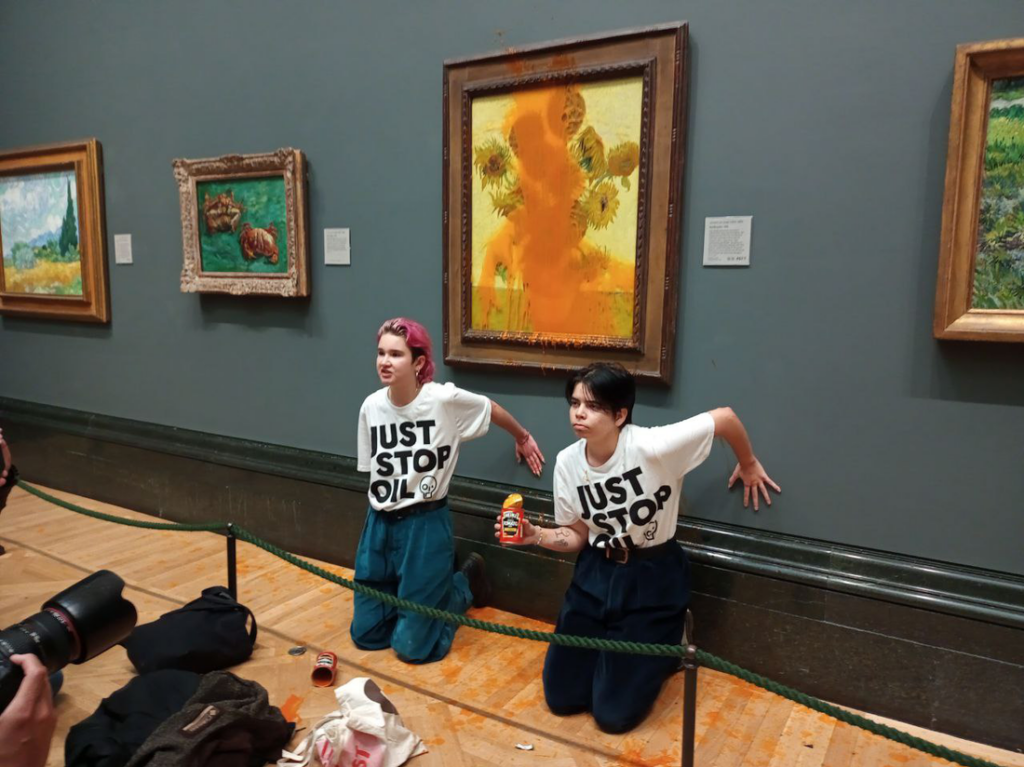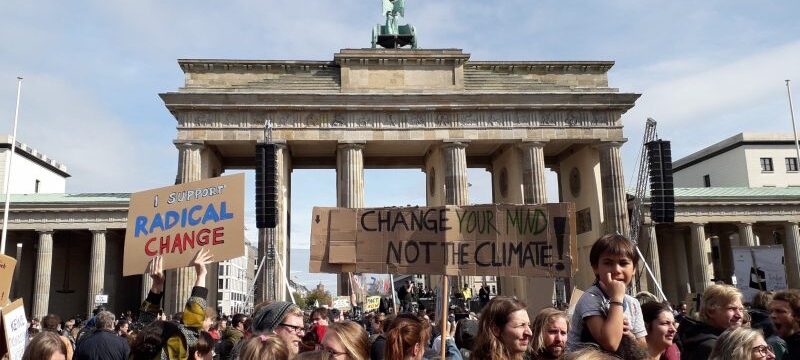We hope that climate activists will soon find a less childishly offensive way of venting their misguided rage than destroying art. But it seems unlikely, especially because of the bizarre way they are coddled. Including an astounding story out of Britain that when motorists began honking at Just Stop Oil activists blocking traffic and keeping cancer patients from reaching a treatment facility, police leaped into action, threatening fines for… one of the guys honking. As for blocking traffic, well, keep obnoxious and carry on. Indeed, Bloomberg’s BNN actively applauded vandalism, saying “The Climate Movement Needs to Embrace Property Destruction”. Great. But if they start with Bloomberg headquarters, the occupants can always try calling the police and seeing who they arrest.
We are not suggesting that citizens take the law into their own hands. At least not directly. But they should do so via their ballots. And as they do so we are asking everyone, from lawmakers to officers to ordinary people, to recall the famous policing principles of Sir Robert Peel, founder of the London “Bobbies” aka the Metropolitan Police, the first modern professional police force, and to consider what happens if they are abandoned by those in law enforcement.
Peel’s rules are remarkably humane and enlightened, emphasizing effective prevention of crime rather than draconian punishment, use of physical force only when other methods had failed, and scrupulous avoidance of political bias. But the one we want to stress here is #7:
“To maintain at all times a relationship with the public that gives reality to the historic tradition that the police are the public and that the public are the police, the police being only members of the public who are paid to give full-time attention to duties which are incumbent on every citizen in the interests of community welfare and existence.”
It is simply not conceivable that the public would think it incumbent on themselves to keep patients and doctors from getting to hospitals, and shrug it off with “disruption is obviously a consequence” and “we hope their treatment goes really well but there’s no liveable future on a dead planet.” They are more likely to share the blunt view of the head of the Metropolitan Police, Sir Mark Rowley, that he’d be happy to leave protestors who chained themselves to the motorway “gantries” (frames holding signs) dangling there like the rude fools they are, but that it really wasn’t safe to do so.
In his defence, Rowley said it was MPs who created muddled legislation on the subject of the “human rights” of protestors who made it very hard for police to clear roads. And it is also the case that these same legislators who cannot or will not properly define “serious disruption” have also promised dramatic action on climate that they have no idea how to carry out.
So activists as well as regular people may be legitimately frustrated at a government that seems as useless as it is pompous. But there comes a time for common sense, what the law used to refer to as the judgement of the ordinary and reasonable “man on the Clapham omnibus” about what the law is and how it should operate. He would not be giving a free pass to punks who jeopardize art and endanger lives, while ticketing the frustrated motorist for showing his disapproval.
There is some hope. A judge convicted two Just Stop Oil protestors who did manage to damage John Constable’s iconic “The Hay Wain” of criminal damage despite their fatuous claim to have been exercising their rights to “freedom of expression” and “freedom of assembly” under Articles 10 and 11 of the European Convention of Human Rights. But it remains to be seen whether they will get the meaningful sentences their acts and the situation call for. And which another did get, in the form of a six-month sentence for climbing a gantry on the M25, Britain’s busiest motorway.
Privileged nits like Guardian contributor Feyzi Ismail, who seriously is “a lecturer in global policy and activism at Goldsmiths, University of London” and also “Co-convenor of MA Postcolonial Culture and Global Policy”, may feel otherwise. She insists that the protests are as essential as they are pointless because:
“The battle between climate protesters and the government is raging, and most people know who is in the right. The people trying to sound the alarm about the climate crisis are closer to mainstream opinion than those enabling fossil fuel corporations to make almost $3bn a day in profit while the planet burns.
After which you just know a conspiracy theory is brewing, with the government sacrificing “democracy” to oil companies. And whee a class war:
“The default alternative is to crack down on the right to protest. This is unlikely to deter the protesters, as Just Stop Oil has vowed to defy the law until the government imposes the death penalty. However hard Suella Braverman and Rishi Sunak might try, they can’t legislate away determination, commitment and, well, the science.”
So like power to the people, man:
“A step up means that, rather than coming into confrontation with ordinary people, the climate movement seeks common cause with their struggles…. First, the focus must include maximising street protest over the climate, and supporting wider protests about the cost of living crisis and the war in Ukraine, both of them tightly linked with energy policy…. Second, the movement must identify with the rising militancy among trade unions and working people – those who can stop production, whether it’s oil and gas or SUVs.”
In point of fact it is precisely “ordinary people” who are fed up with the antics of the bourgeois boutique radicals. And it’s not as though these people lack input into the policy process including the sympathy of a bewildering number of professors, journalists and indeed politicians. For them to claim to be marginalized spokespersons for the majority is just one more piece of disruptive insolence.
If the police don’t make sure sanity prevails, the social contract is in jeopardy, and with it civility and even safety.
P.S. Some versions of the Bloomberg story have been semi-sanitized to variants of “Should the Climate Movement Embrace Property Destruction?” at least in the headline. But Marc Morano at Climate Depot screen-capped the original. As we did the story we linked to in the introduction.



Are these activists not simply the mal-educated produce of the professoriate, self-actualizing vicariously through their vandalism and reported as "protests". They are the cousins of the humanities professoriate promoting fascism and racism under the banners of ANTIFA and BLM, all "brown shirts" of the institutional left draped in green.